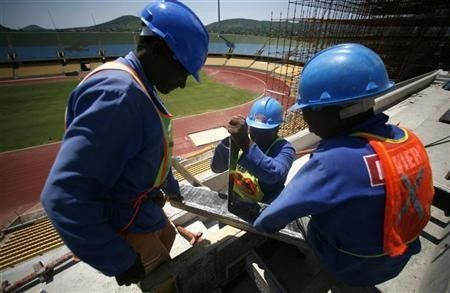S.Africa eyes labour reform, railways to end poverty

South Africa's National Planning Commission unveiled a plan on Friday to reduce unemployment and poverty plaguing Africa's biggest economy, but key elements may be blocked by a powerful union in a governing alliance with the ruling ANC.
The plan calls for incentives to take on new workers at cut-rate wages, hire staff on short-term contracts and make it easier for firms to fire workers, in a country seen as having some of the world's most rigid labour laws.
The NPC plan also calls for a push to help raise exports where South Africa has a competitive advantage and for cutting red tape for private sector firms, such as Internet companies, that can help build the economy and cut prices for consumers.
It calls for improving the mining industry by building new rail lines to transport coal and boosting port activity by building the infrastructure to import liquefied natural gas.
The NPC wants to end poverty by 2030, nearly triple GDP and lower the unemployment rate to single digits -- goals considered highly unlikely by many economists.
The ANC has rolled out a variety of plans to lift the economy over the years with little success as funds have been lost to corruption and mismanagement while policies were not properly formulated to bring about change.
The NPC's ideas for labour reform have been backed for years by economists as necessary to make South Africa more competitive globally.
But they have also been rejected by the leading labour federation COSATU, which has used its 2 million members as a voting block to keep the African National Congress in power.
COSATU is not beholden to the unemployed. They are beholden to the employed, which is their membership, labour expert Tony Healy said.
With about 40 percent of the adult population jobless, the ANC government is dealing with a ticking time-bomb that raises the risk of social unrest and instability down the line.
The country has lost about a million jobs in the past two years, with the key manufacturing sector the hardest hit.
Youth unemployment is about 50 percent, and a study by the South African Institute of Race Relations said about half of the current generation of those aged 25 to 34 years old will never work in their lifetimes.
President Jacob Zuma is relying on COSATU'S support as he heads into a major ANC meeting next year where he is seeking re-election as the party's leader, which in turn means the country's presidency given the ANC's stranglehold over politics.
To appease COSATU, Zuma's government has proposed a raft of union-friendly legislation that a team of experts commissioned by the presidency said would drive up unemployment and raise labour costs for employers.
The NPC said the criticism that the production side of the economy was not competitive because costs were too high and labour laws too rigid was probably true in some sectors.
The NPC's 20-year plan will head to Zuma for consideration and it will be up to him and the cabinet to take up its recommendations.
© Copyright Thomson Reuters 2024. All rights reserved.




















